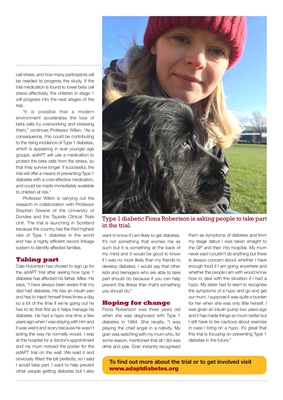
KITLIVINGLIVING
safety and whether the trial design works,
whether the medication can reduce beta
cell stress, and how many participants will
be needed to progress the study. If the
trial medication is found to lower beta cell
stress effectively, the children in stage 1
will progress into the next stages of the
trial.
"It is possible that a modern
environment accelerates the loss of
beta cells by overworking and stressing
them," continues Professor Wilkin. "As a
consequence, this could be contributing
to the rising incidence of Type 1 diabetes,
which is appearing in ever younger age
groups. adAPT will use a medication to
protect the beta cells from the stress, so
that they survive longer. If successful, the
trial will offer a means of preventing Type 1
diabetes with a cost-effective medication,
and could be made immediately available
to children at risk."
Professor Wilkin is carrying out the
research in collaboration with Professor
Stephen Greene of the University of
Dundee and the Tayside Clinical Trials
Unit. The trial is launching in Scotland
because the country has the third highest
rate of Type 1 diabetes in the world
and has a highly efficient record linkage
system to identify affected families.
Taking part
Cale Hutcinson has chosen to sign up for
the adAPT trial after seeing how type 1
diabetes has affected his father, Mike. He
says, "I have always been aware that my
dad had diabetes, He has an insulin pen
and has to inject himself three times a day
so a lot of the time if we're going out he
has to do that first as it helps manage his
diabetes. He had a hypo one time a few
years ago when I was staying with him and
it was weird and scary because he wasn't
acting the way he normally would. I was
at the hospital for a doctor's appointment
and my mum noticed the poster for the
adAPT trial on the wall. We read it and
obviously fitted the bill perfectly, so I said
To find out more about the
trial or to get involved go to
the website:
www.adaptdiabetes.org
I would take part. I want to help prevent
other people getting diabetes but I also
want to know if I am likely to get diabetes.
It's not something that worries me as
such but it is something at the back of
my mind and it would be good to know
if I was no more likely than my friends to
develop diabetes. I would say that other
kids and teenagers who are able to take
part should do because if you can help
prevent this illness then that's something
you should do."
Hoping for change
Fiona Robertson was three years old
when she was diagnosed with Type 1
diabetes in 1984. She recalls, "I was
playing the chief angel in a nativity. My
gran was watching with my mum who, for
some reason, mentioned that all I did was
drink and pee. Gran instantly recognised
them as symptoms of diabetes and from
my stage debut I was taken straight to
the GP and then into hospital. My mum
never said I couldn't do anything but there
is always concern about whether I have
enough food if I am going anywhere and
whether the people I am with would know
how to deal with the situation if I had a
hypo. My sister had to learn to recognise
the symptoms of a hypo and go and get
our mum. I suppose it was quite a burden
for her when she was only little herself. I
was given an insulin pump two years ago
and it has made things so much better but
I still have to be cautious about exercise
in case I bring on a hypo. It's great that
this trial is focusing on preventing Type 1
diabetes in the future."
Type 1 diabetic Fiona Robertson is asking people to take part
in the trial.